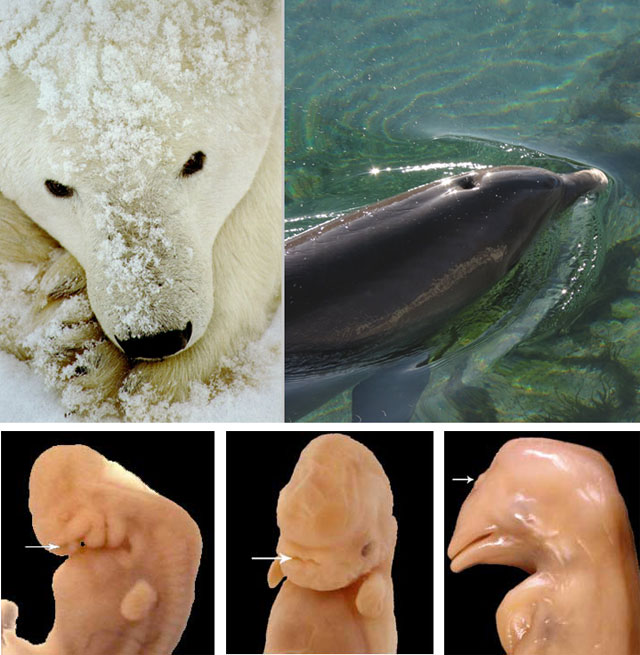Hi Greg,
Thanks for the gracious reply in a different post. Yes, we had the privilege of honoring our God and King this morning. He was there in His Word, in His Spirit, and in His body.
Here I think you are not fully familiar with a branch of science, this time about biology. Did you know these facts?
(1) Whale embryos have 2 nostrils in the usual location for mammalian embryos, at the tip of the snout. As the baby whale develops inside the mother whale, the nostrils move toward the top of the head. The bottom row of images demonstrate this happening in the various embryonic stages of a whale:

In some species of whales, the odontocetes or toothed whales, they merge to form a single blowhole. In others, the baleen whales, they remain separate, and the adult whale has a pair of blowholes.
(2) When paleontologists examine the fossilized skulls of cetaceans, they observe a gradual movement of nostrils toward the top of the head. Here is a summary of what they have found:
(3) As points 1 and 2 demonstrate, biologists and paleontologists are not relying on a single skull from 60 million years ago as evidence of the evolution history of whales. They have enormous amounts of data that can be classified in nine different lines of evidence. That National Geographic video did not have the goal of discussing all of the evidence behind that evolution; the goal of the video was to discuss the one fossilized skull from 60 million years ago. So I understand how you might have gained the wrong impression.
To give you a better understanding of all of the evidence, I offer you a link to a discussion of the nine different lines of evidence.
Again, that is not nine pieces of evidence, but nine lines of evidence. Each line has a very large body of evidence.
If you have any questions about the nine lines, feel free to ask more questions. I am not an expert on cetacean evolution, but I would be happy to help dig up answers to any questions you might have.
I see no indication that the apostle Peter limited knowledge to just one kind of knowledge, and not the whole realm of knowledge. I think you are making an assumption about the passage that is not there. Certainly knowledge would include theological knowledge, but why would it not include knowledge about the creation God made, or even knowledge about transistors, and history, and literature? So I invite you to show me where I might have overlooked, perhaps in the verse before or the verse after, an indication from the apostle Peter that he was only (under the inspiration of the Holy Spirit) speaking of a narrowly limited type of knowledge, and not the whole realm of knowledge.
Blessings,
Chris Falter
